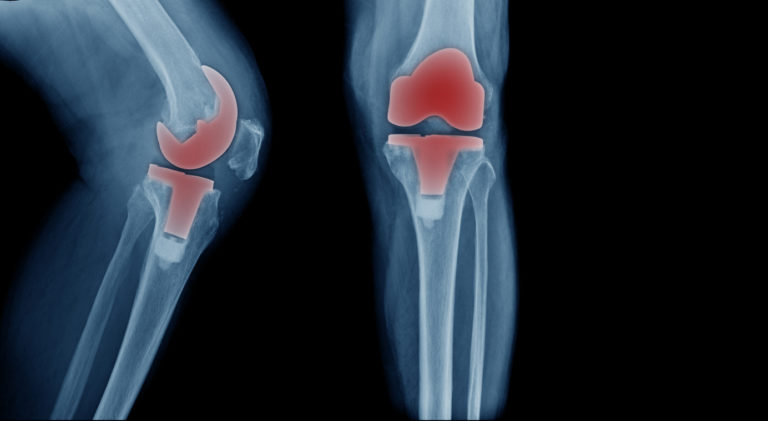If you are experiencing pain in your knee, you may be considering a total knee replacement. This is a major surgery, but it can be life-changing for those who suffer from chronic knee pain. In this blog post, we will discuss everything you need to know about total knee replacements. We will talk about the surgery itself, as well as the recovery process. We will also discuss what to expect after surgery and how to prepare for it. If you are considering a total knee replacement, this blog post is for you!
Contents
What Does Total Knee Replacement Mean?
 Total knee replacement (TKR) is a surgery to relieve pain and restore function in your knee joint. It’s also called total knee arthroplasty. It is a type of surgery for people who have severe knee damage from arthritis or injury. The damaged bone and cartilage are removed and replaced with an artificial joint (prosthesis). The prosthesis is usually made of metal and plastic.
Total knee replacement (TKR) is a surgery to relieve pain and restore function in your knee joint. It’s also called total knee arthroplasty. It is a type of surgery for people who have severe knee damage from arthritis or injury. The damaged bone and cartilage are removed and replaced with an artificial joint (prosthesis). The prosthesis is usually made of metal and plastic.
TKR may be an option if you:
- Have moderate or severe pain most days that limits your daily activities
- Have tried other treatments, such as medicines, knee braces, and physical therapy, and they haven’t worked
- Can no longer do the activities you enjoy because of your knee pain
- Have arthritis in your knee that has damaged at least half of the knee joint surface
It is believed that total knee replacement is one of the most successful procedures in all of medicine. More than 600,000 knee replacements are done each year in the United States. If you feel you may be a candidate for this procedure, please consult your doctor.
How Does It Work?
This is a common question. In order to understand how a total knee replacement works, it is first important to understand a little about the anatomy of the knee joint. The knee joint is where the femur (thighbone) meets the tibia (shinbone). It is a “hinge” joint, which means that it allows the leg to bend and straighten.
There are three bones that make up the knee joint: the femur, the tibia, and the patella (kneecap). The ends of these bones are covered with a smooth material called cartilage. Cartilage acts as a “cushion” between the bones and allows the joint to move smoothly.
The knee joint is held together by ligaments. These are strong bands of tissue that connect the bones and keep the joint stable. It is believed that total knee replacement is one of the most successful and commonly performed surgeries in the United States.
What To Expect From Total Knee Replacement?
Well, this is not going to be an easy road. You’ll probably have to stay in the hospital for a few days after your surgery. You can expect some pain and discomfort as you adjust to your new knee. But don’t worry, the pain will lessen over time and you should be up and moving around within a few weeks.
Your new knee will likely feel stiff at first, but that’s to be expected. It will take some time to get used to the sensation of having a new joint. You may also have some swelling and bruising around the area. Again, this is normal and will fade over time.
It’s important to keep your new knee moving as much as possible after surgery. Also, be sure to follow your physical therapist’s instructions for at-home exercises. This will help keep your knee strong and flexible.
You can expect to see a big difference in your overall mobility and quality of life after having a total knee replacement. Most people report feeling much better and having less pain than they did before surgery.
Of course, every surgery comes with some risks. These include infection, blood clots, and problems with the implant. Be sure to talk to your doctor about all the risks before having surgery.
Total knee replacement is a big decision, but it can be a life-changing one. If you’re considering this surgery, be sure to do your research and talk to your doctor to see if it’s right for you.
What Are The Benefits?
There are many benefits that come with having a total knee replacement. The first and most obvious benefit is the elimination or drastic reduction of pain in the knee joint. This can provide a huge relief for patients who have been dealing with chronic knee pain for years.
Another important benefit is an increased range of motion in the knee joint. This can lead to a significant increase in mobility and independence, allowing patients to enjoy activities that were once impossible or very difficult.
In addition, a total knee replacement can also help to improve the alignment of the leg, which can in turn help to reduce stress on other joints in the body. This can lead to a decrease in pain in other areas of the body, such as the hip and back.
Finally, a total knee replacement can also help to improve the overall quality of life for patients. This procedure can lead to increased confidence and self-esteem, as well as a greater sense of independence.
Overall, if you are suffering from chronic knee pain or other debilitating symptoms, a total knee replacement may be the best course of action for you. This procedure can provide you with significant pain relief, increased mobility, and improved quality of life.
How Painful Is Total Knee Replacement?
 Many people who undergo total knee replacement surgery report very little pain afterward. The majority of patients say that the level of pain they experience is manageable and that it decreases significantly within the first few days or weeks following their surgery.
Many people who undergo total knee replacement surgery report very little pain afterward. The majority of patients say that the level of pain they experience is manageable and that it decreases significantly within the first few days or weeks following their surgery.
That said, some people do experience more significant levels of pain after total knee replacement surgery. This is usually due to complications such as infection or bleeding. If you experience severe pain after your surgery, be sure to tell your doctor so that they can help you manage it.
Moreover, it is important to keep in mind that pain is different for everyone. While one person may have little to no pain after total knee replacement surgery, another person may experience more discomfort. Ultimately, your experience will depend on a variety of factors, including your overall health, the severity of your arthritis, and the type of surgery you had.
So, do not forget to keep your doctor in the loop regarding your pain levels after surgery. This way, they can help you find the best way to manage it and ensure that you are as comfortable as possible.
What Is The Role Of Physical Therapy?
Now, this is the meat of things. You have to do physical therapy post-surgery in order to regain range of motion as well as strengthen the muscles around the knee joint. The therapist will most likely use electrical stimulation and ice/heat treatments in addition to exercises.
A lot of times, patients are given a continuous passive motion machine to use at home, which is a device that slowly and passively bends and straightens the knee for you. Your therapist will also likely give you exercises to do at home, and it is important that you follow through with these in order to recover as quickly and fully as possible.
For example, there are a few key exercises that are often prescribed for people post-TKR surgery. These include:
- Quad Sets: In order to do this exercise, you will need to prop yourself up on your elbows and a pillow so that your knee is at a 90-degree angle. From there, you will tighten your thigh muscle (the quadriceps) and hold for 5 seconds before relaxing. You should repeat this 10-15 times.
- Hamstring Curls: For this exercise, you will need to lie on your back with a towel looped around your foot. From there, you will raise your leg up towards your butt and then slowly lower it back down. You should repeat this 10-15 times.
- Ankle Pumps: This is a simple exercise where you will just need to flex and point your foot 10-15 times in order to help with blood circulation.
These are just a few examples, but there are many different exercises that your therapist may prescribe depending on your individual case. It is important to follow their instructions and not try to do too much too soon, as this could jeopardize your recovery.
What Are Some Concerns And Limitations?
When considering a total knee replacement, it’s important to be aware of the potential risks and limitations associated with the surgery. While complications are rare, they can occur. These may include:
- Infection: Infection is one of the most serious complications that can occur after any type of surgery. It can cause pain, stiffness, and swelling in the joint and may require additional surgery to clean the area.
- Blood clots: Blood clots can form in the leg or lung and may be life-threatening. To help prevent this, you’ll be given blood thinners after surgery.
- Nerve damage: Nerves surrounding the knee can be damaged during surgery, which can cause numbness, tingling, or weakness in the foot or leg.
- Fracture: Although it’s rare, the bone around the implant can fracture during or after surgery.
- Loosening: The artificial joint may loosen over time, causing pain and instability. This is more likely to occur if you have an infection or put too much stress on the joint.
- Wear and tear: The artificial joint may wear out over time, causing pain and instability. This is more likely to occur if you’re younger or put too much stress on the joint.
- Dislocation: The artificial joint may dislocate, or come out of place. This is more likely to occur if you have an infection or put too much stress on the joint.
These are just some of the risks and complications associated with total knee replacement surgery. Be sure to talk to your doctor about all potential risks and complications before having the procedure. It is important to weigh the risks and benefits of the surgery before making a decision.
Total knee replacement surgery is a major operation. It’s important to be sure you understand all the risks and benefits before having the procedure. Be sure to talk to your doctor about your concerns and questions. Together, you can decide if total knee replacement surgery is right for you.
Conclusion
To conclude, total knee replacement is a major surgery that can have a profound impact on your life. The decision to undergo the procedure should not be taken lightly, and you should be sure to consult with your doctor to see if it is the right choice for you. This can offer a significant improvement in the quality of life for many people, but it is not without risks and potential complications. Be sure to weigh all the factors before making your decision.
Physical Therapy help patients recover from pain. If you’re experiencing Back pain, Shoulder pain, Knee pain, Neck pain, Elbow pain, Hip pain, or Arthritis pain, a physical therapist at MantraCare can help: Book a physiotherapy session.


